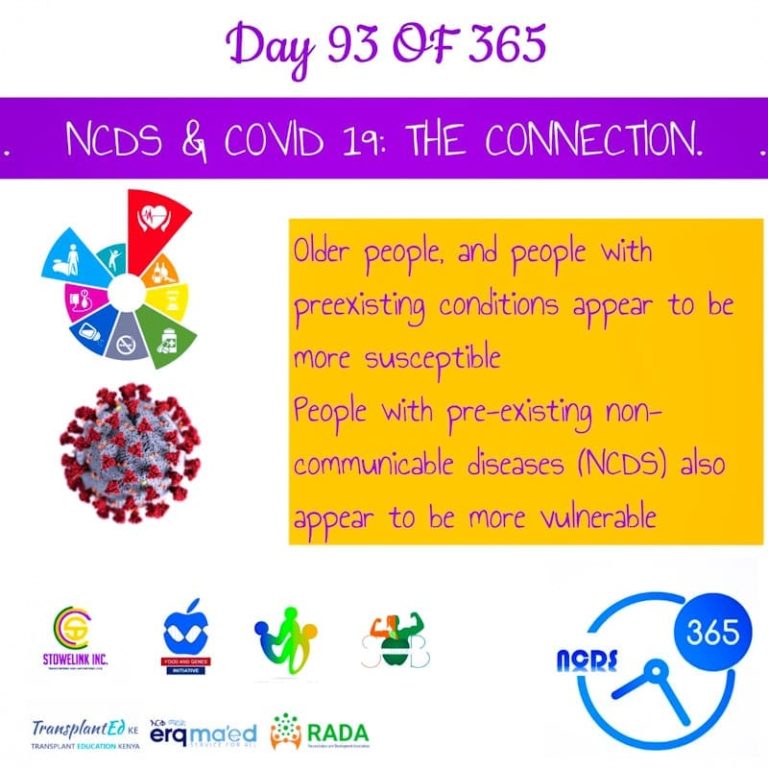What you should know and do to continue preventing NCDs and COVID-19?
The latest evidence from epicenters of the Corona Virus show that persons living with Non Communicable Diseases (NCDs) -like diabetes, Heart disease, Cancers, etc. and older people are most at risk of contracting the virus and experiencing more severe symptoms, compared to those without preexisting conditions.

This adds to the burden that health care workers, families and caregivers face in the global response.
The WHO note on COVID-19 and NCDs does not only bring to light this sad reality. It highlights how the already existing NCD and mental health challenge has been further aggravated by the COVID-19 Pandemic. Mental health is a significant concern. Despite great work at the front lines, we have heard about the suicide of Nurses, Doctors, and a Minister of Finance attributed to the pressure related to the response. What about new NCD cases that are emerging because measures taken such as quarantining, lock-downs, etc, are significantly, hampering NCD prevention activities in unprecedented levels. The World Health Organization has been clear about the need to protect persons with preexisting conditions like diabetes, cardiovascular diseases or cancer in prevention calls. I am even more concerned about the fact that two weeks of Quarantine or lock-down will have a major impact on the health decisions a person makes, including how to exercise, stay mentally healthy and cope with the COVID -19 situation in your country.
You may already be wondering how you can stay healthy during this time of the COVID-19 Pandemic.
There are a few ways you can stay healthy during this difficult time.
- Self-Care: Self-care is a concept in holistic leadership where you learn how to balance work and health and family. You should take time to treat yourself with courtesy. If you are already living with an NCD, know that the world is with you. Many people are thinking about you. Negotiate with yourself on what to do, how to do it, and when to do it so that you prioritize what is most helpful to you. It’s important for your health. Your health is your real wealth. If you are a leader, and wish to learn how to navigate these changes in your life and lead well, you could join dialogues that allow leaders to discuss challenges and support each other to lead well and be strong during this time. RADA is running self care online sessions that you should watch out for on our spaces. In Self-care, you simply reward yourself as you do both what you MUST do and what you should do to stay human, strong and enjoy the life you have.
- Exercise: How are you exercising during this time? Exercise helps your mind, brain and even your feelings. This does not have to be a hard hit on you every morning. Frankly, a five-minute teaser can raise you to 10 minutes and before you know it, the routine of 5 minutes will afford you a 15 minutes workout session once a day whose importance and assistance you will love. It helps you stay fit and assists you to remain mentally strong, ready and capable of managing stress. There are lots of short videos on you tube on ways to stay active at home or in small spaces. You can Click Here for a great combination from World Athletics specifically to support you during this global challenge: You can use some of these to follow personally in your small space.

- Mental Health; Build a team: If you do not have access to a few people even while observing social distancing, how would you manage to stay connected to others? The above online session mentioned on Self care is an example of how you can connect with others and navigate the changing and even stressful time. Social media has its good and bad sides. But with proper use of social media, one can stay connected with working teams and do better; feel better, stronger and lead effectively. We all need that human connection. Technology has been criticized for not being able to provide us such human connection as reality does, this is a best bet at this time. After all, they are human beings. But also, don’t miss a chance of fellowship, playing, talking, discussing, dialoguing with others around you as long as you all are safe. In fact, stay as reasonably connected to humans as possible. Workaholics don’t seem to get it. If you are like me, you will discipline yourself with breaks of 5-10 minutes, singing (if you like singing to music), Dancing and other aspects of meaningful distractions. Seek psycho-social care/counseling if you feel the kind of mental stress or confusion that you feel you should talk to some counselor or a dependable psychologist. Avoid alcohol. The solution in the bottle is not the solution to the problem that is out of the bottle. That’s nothing but a strong temptation to ruin the heart, lungs, liver and brain for you. Harmful use of alcohol should be avoided. This is same with smoking. In times of stress, smokers feel that this helps them. But what does it profit for smoking to temporarily “help” you and introduce you to a new pain and suffering?
- Prayers: Really? Yes! It is amazing how prayer moves mountains. As Christians put it, and as is written in the bible, be careful for nothing, but make your request through prayer, known unto God and His peace that surpasses all understanding will guard your hearts and minds in Christ Jesus. This is an important example that meditation, reflection, proper thinking and prayers are helpful to stabilize you emotionally and other wise, so that you remain strong and healthy and can be a force for good, not for evil within this period.
- Eat Healthy: At this time, staying at home becomes a risk for eating more than we should and sleeping more as well. Reason should prevail and you can ensure that you eat at the right times, rest at the right times, work at the right times and play the right times. Eating habits die hard. But you can target to eat good food if you have. If you don’t have, reach out for assistance depending on your community humanitarian networks. In Cameroon, RADA has created the Rapid Community Mutual Aid Response program. This links those in need of livelihood support to those who can support. You can find it here. But unhealthy dieting is the number one risk factor for developing NCDs. You don’t want to develop NCDs after escaping COVID-19 because you don’t control or take special care of your diets. Don’t fall on junk food and processed foods. As much as it depends on you, try to remain with healthy foods.
Please listen to my friends Brian A. and Ronnel V.’s music below to comfort us as we pass through this moment.
See you at the Top!!
Some References:
- John Hopkins University information site
- Global NCD Alliance Compendium of NCD & COVID Resources
- https://www.who.int/docs/default-source/coronaviruse/coping-with-stress.pdf?sfvrsn=9845bc3a_2
- https://www.worldathletics.org/be-active/lifestyle/lockdown-exercises
- Https://psychcentral.com/blog/what-self-care-is-and-what-it-isnt-2/
- https://www.who.int/docs/default-source/coronaviruse/mental-health-considerations.pdf
